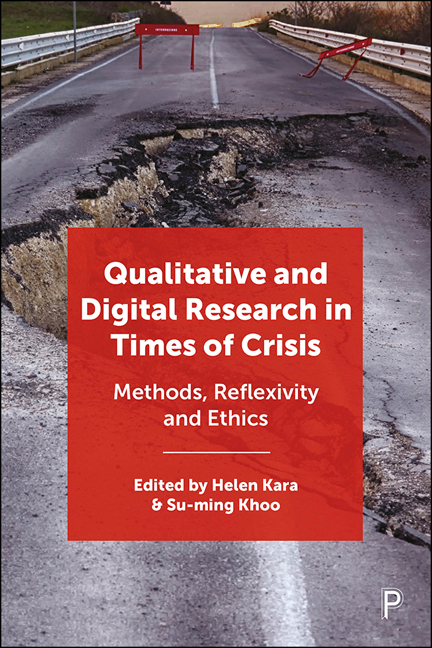Introduction
Published online by Cambridge University Press: 13 May 2022
Summary
‘Times of crisis’ brings to mind unexpected, unprecedented circumstances that appear suddenly. Yet ‘crisis’ has somehow become commonplace. The word ‘crisis’ has two roots – one denotes ‘a vitally important or decisive stage in the progress of anything; a turning-point’, which in more recent use implies a sense of ‘difficulty, insecurity, and suspense’ (OED). The other, connected root meaning relates this sense of turning point specifically to disease, a critical point when a patient might get better or worse (OED). This dual sense is useful to think with, as this book was written during the global COVID-19 pandemic. Researchers were severely impacted by its effects, even as other diseases, economic and political crises, conflict, climate catastrophe and connected ecological crises of wildfires, water shortages, flooding, and hurricanes continued to occur. The pandemic presented an opportunity to call for engagement in a process of collective reflection and to think about how research might get better (or worse), and how we might think of methodological problems and solutions, discomfort and comfort, dis-ease or ease in the conduct of research. We edited and published three e-books rapidly, in the midst of the continuing and unfolding global public health crisis (Kara and Khoo, 2020 a,b,c). These rapid publications, and this volume, now sit alongside other collectively created responses, such as the crowd-sourced advice on doing fieldwork in pandemic conditions collected by Deborah Lupton (Lupton, 2020) and the rapid review conducted by the UK National Centre for Research Methods (Nind, Meckin, and Coverdale, 2021).
This volume takes time to reflect on qualitative and digital methods, taking ‘crisis’ as a turning point for reflexivity and positionality in research methods and ethics. Its 15 chapters draw on the experiences and reflections of 33 researchers doing diverse research in the context of the COVID-19 pandemic, from the UK, Ireland, Nepal, New Zealand, Australia, Puerto Rico, Gaza, Nigeria, and Guatemala. The editors’ geographically diffuse interests and networks probably influenced the character and spread of the contributions in this book. Many concern different locations as ethical environments, making different types of connections and ethical and creative dialogues across researcher-researched relationships and their settings.
- Type
- Chapter
- Information
- Qualitative and Digital Research in Times of CrisisMethods, Reflexivity and Ethics, pp. 1 - 14Publisher: Bristol University PressPrint publication year: 2021



